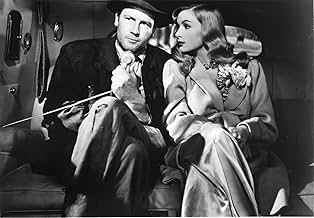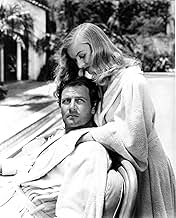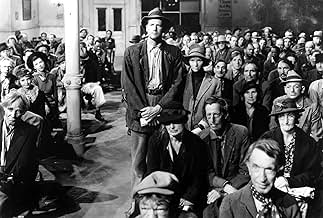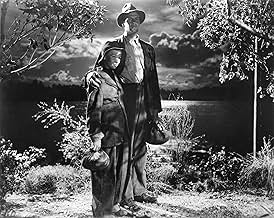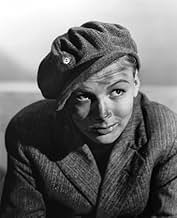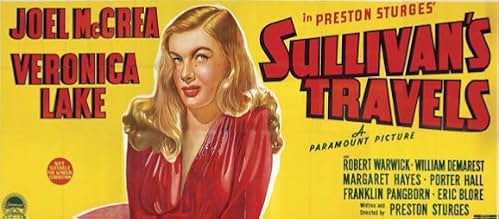IMDb-BEWERTUNG
7,9/10
29.305
IHRE BEWERTUNG
Ein Hollywood-Regisseur, John L. Sullivan, macht sich auf den Weg, das Leben als armer, obdachloser Mensch zu erleben, um relevante Lebenserfahrung für seinen nächsten Film zu sammeln.Ein Hollywood-Regisseur, John L. Sullivan, macht sich auf den Weg, das Leben als armer, obdachloser Mensch zu erleben, um relevante Lebenserfahrung für seinen nächsten Film zu sammeln.Ein Hollywood-Regisseur, John L. Sullivan, macht sich auf den Weg, das Leben als armer, obdachloser Mensch zu erleben, um relevante Lebenserfahrung für seinen nächsten Film zu sammeln.
- Auszeichnungen
- 2 wins total
Charles R. Moore
- Colored Chef
- (as Charles Moore)
Handlung
WUSSTEST DU SCHON:
- WissenswertesCinematographer John Seitz admired Preston Sturges' unconventional approach to his work. The opening scene comprised ten pages of dialogue to cover about four and a half minutes of screen time. It was scheduled for two complete days of shooting. On the morning of the first day, Seitz found Sturges inspecting the set with a viewfinder, looking for where he could cut the scene and change camera set-ups. Seitz dared him to do it all in one take. Never one to refuse a dare, Sturges took him up on it, although the nervous Seitz had never attempted to complete a two-day work schedule in one day. With the endorsement of McCrea and the rest of the actors, Sturges pressed on, determined to set a record. The first take was fine, but the camera wobbled a little in the tracking shot following the men from screening room to office, so they tried again. They did two or three takes at the most and that was it - two full days work by 11 a.m. on the first day, a feat that had the entire studio buzzing.
- PatzerWhen Sullivan and the Girl jump off the train and walk to the lunch stand, nothing is visible around the outside of the lunch stand--not a car, tree or anything. When Sullivan asks if the proprietor had seen a land yacht (a big RV), the proprietor points to the side and they look out the window and see the big land yacht parked there. Of course, if it had been there in the first place, Sullivan would have seen it right away and not gone into the lunch stand.
- Zitate
[last lines]
John L. Sullivan: There's a lot to be said for making people laugh. Did you know that that's all some people have? It isn't much, but it's better than nothing in this cockeyed caravan.
- Crazy CreditsThe Paramount logo appears as a seal on a package.
The package is opened to reveal a book with the film title on it and the opening credits appear on pages in the book.
- VerbindungenFeatured in The Cinematographer (1951)
- SoundtracksSpring Song
(1844) (uncredited)
Written by Felix Mendelssohn
Played as part of the score when Sullivan starts his experiment
Reprised when he starts a second time
Ausgewählte Rezension
As a professional circus clown for twenty years,I think that Sullivan's Travels is the best, most lucid, explanation of what comedy is all about that has ever been made. Sure it's hokey, corny, contrived, and meandering. But so is all great comedy, from Shakespeare to Seinfeld! If you want your comedy to be tightly constructed, meaningful, unambiguous, and logical, then you do not want comedy at all -- you want some stuffy college professor's idea of What is Comedy for a term paper.
The glorious truth is that you cannot domesticate great comedy. It occurs on no regular basis, from no reliable source, and is accountable to no one for what it says and does. Preston Sturges wanted to make that point in Sullivans Travels and he does so exceedingly well with everything from slapstick frolics in the land cruiser to fleas in the bed to hectoring soliloquies about poverty from the butler.
Ten years before Chaplin tried to explain the same thing in his movie Limelight, Sturges tells a tale meant to both hearten and cozen us. It heartens us to know that a cynical, moneygrubbing place like Hollywood will continue to spin out comedies, because they make money. And it cozens us into thinking there is something magical about comedians. Anyone who has ever actually known or been married to a professional funnyperson knows they are by turns grumpy, lazy, tempermental, stubborn, and always insecure. Not the life of the party. But so what? They're clowns, god bless 'em, and that's all that counts.
You'll never understand the craft of humor if you don't watch, and love, Preston Sturges Sullivan's Travels!
The glorious truth is that you cannot domesticate great comedy. It occurs on no regular basis, from no reliable source, and is accountable to no one for what it says and does. Preston Sturges wanted to make that point in Sullivans Travels and he does so exceedingly well with everything from slapstick frolics in the land cruiser to fleas in the bed to hectoring soliloquies about poverty from the butler.
Ten years before Chaplin tried to explain the same thing in his movie Limelight, Sturges tells a tale meant to both hearten and cozen us. It heartens us to know that a cynical, moneygrubbing place like Hollywood will continue to spin out comedies, because they make money. And it cozens us into thinking there is something magical about comedians. Anyone who has ever actually known or been married to a professional funnyperson knows they are by turns grumpy, lazy, tempermental, stubborn, and always insecure. Not the life of the party. But so what? They're clowns, god bless 'em, and that's all that counts.
You'll never understand the craft of humor if you don't watch, and love, Preston Sturges Sullivan's Travels!
Top-Auswahl
Melde dich zum Bewerten an und greife auf die Watchlist für personalisierte Empfehlungen zu.
Details
Box Office
- Budget
- 689.665 $ (geschätzt)
- Weltweiter Bruttoertrag
- 10.249 $
- Laufzeit1 Stunde 30 Minuten
- Farbe
- Seitenverhältnis
- 1.37 : 1
Zu dieser Seite beitragen
Bearbeitung vorschlagen oder fehlenden Inhalt hinzufügen

Oberste Lücke
By what name was Sullivans Reisen (1941) officially released in Canada in French?
Antwort

